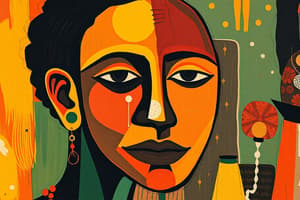Podcast
Questions and Answers
What is a primary focus of biological anthropology?
What is a primary focus of biological anthropology?
- Cultural practices of ancient civilizations
- Relics and artifacts from prehistoric times
- Physical features and evolution of humans (correct)
- Anthropological methods of data collection
What significant theory is associated with Charles Darwin in anthropology?
What significant theory is associated with Charles Darwin in anthropology?
- Ethnographic method
- Structuralism
- Theory of evolution (correct)
- Cultural relativism
Which branch of anthropology focuses on relics and artifacts from the past?
Which branch of anthropology focuses on relics and artifacts from the past?
- Political anthropology
- Biological anthropology
- Archaeology (correct)
- Cultural anthropology
In which century did anthropology begin as a distinct discipline?
In which century did anthropology begin as a distinct discipline?
What overlapping fields does modern anthropology engage with?
What overlapping fields does modern anthropology engage with?
What is the main focus of economic history?
What is the main focus of economic history?
Which figure is known as the 'Father of History'?
Which figure is known as the 'Father of History'?
What does the term 'utilitarianism' primarily advocate for?
What does the term 'utilitarianism' primarily advocate for?
What is a key concept in economics related to the management of resources?
What is a key concept in economics related to the management of resources?
What is the primary difference between physical and human geography?
What is the primary difference between physical and human geography?
Which theme of geography deals with the characteristics of different areas?
Which theme of geography deals with the characteristics of different areas?
What does the term 'economic fluctuation' relate to?
What does the term 'economic fluctuation' relate to?
What does the etymology of the word 'economics' suggest about its meaning?
What does the etymology of the word 'economics' suggest about its meaning?
Which of the following best describes the discipline of linguistics?
Which of the following best describes the discipline of linguistics?
Flashcards are hidden until you start studying
Study Notes
Discipline of Anthropology
- Focuses on the study of people and their cultures.
- Emerged in the 19th century as a distinct field.
- Marcel Mauss contributed the idea of gifts creating complex social bonds.
- Ethnography became a key method in the 20th century for understanding cultures.
Important Figures
- Charles Darwin: Proposed the theory of evolution and the "Out of Africa" hypothesis regarding the spread of Homo sapiens.
Branches of Anthropology
- Biological Anthropology: Examines human evolution, physical characteristics, and biological evidence.
- Cultural Anthropology: Studies cultural practices and employs ethnographic methods.
- Archaeology: Investigates relics from the past to uncover the narratives of ancient cultures.
Anthropology at Present
- Intersects with natural and social sciences.
- Often studied alongside linguistics and genetics.
Political Anthropology
- Explores the dynamics of power and governance.
Medical Anthropology
- Investigates diverse experiences of medical practices and beliefs.
Economics
- Focuses on wealth management and how societies address resource scarcity.
Etymology of Economics
- Derived from Greek: "OIKOS" meaning house and "NOMOS" meaning custom/law.
Key Economic Figures and Ideas
- David Ricardo: Advocated laissez-faire economics, promoting free market capitalism.
- John Stuart Mill: Proposed utilitarianism, emphasizing the greatest happiness principle.
- Adam Smith: Known as the father of modern economics; authored "The Wealth of Nations."
- Karl Marx: Critiqued capitalism through historical materialism, highlighting economic systems' impact on society.
Key Concepts in Economics
- Supply and demand dynamics.
- Savings and investment strategies.
- Cost and price assessments.
- Economic fluctuations and their effects.
- Value assigned to work and natural resources.
- Money as a medium of exchange.
- Banking and finance systems.
- Capital accumulation and wealth distribution.
- Employment dynamics and unemployment issues.
- Distribution of goods and services.
Geography
- Encompasses the study of Earth's physical features and human interactions with the environment.
- Focuses on describing the Earth (from Greek "GEO" for earth and "GRAPHE" for description).
Five Major Themes of Geography
- Relationships between people and environments.
- Location: relative (distance) and absolute (longitude & latitude).
- Place: distinguishes physical and human features.
- Region: identifies areas with common characteristics.
- Movement: analyzes interconnectivity among people.
Branches of Geography
- Physical Geography: Examines natural systems, including climate and landforms.
- Human Geography: Assesses human aspects of geography, including cultural impact and population distribution.
Important Figures in Geography
- Islamic scholars in early mapmaking.
- Marco Polo's travels in the 13th century.
- Eratosthenes, who coined the term "geographia."
- The development of the compass by the Chinese in the 10th century.
History
- A discipline focused on studying past events, their causes, and effects.
- Originates from the Greek term "historia," meaning inquiry.
What History Entails
- Aims to uncover truth through evidence, often derived from primary sources and testimonies.
Historiography
- The writing of history; used cuneiform and hieroglyphics in ancient documentation.
Branches of History
- Social History: Centers on common people's experiences.
- Political History: Examines political events, movements, and leaders.
- Cultural History: Studies customs, arts, and traditions.
- Economic History: Investigates economic practices and goods distribution.
- Military History: Analyzes warfare and military strategies.
- Diplomatic History: Focuses on international relations among nations.
- History of Women: Explores women's roles and contributions.
- History of Religion: Investigates religious beliefs and practices.
- Environmental History: Studies human relationships with the environment.
Important Figure in History
- Herodotus: Known as the "Father of History," contributed significantly to historical writing in ancient Greece.
Discipline of Linguistics
- Scientific study of language as a fundamental aspect of human behavior.
- Explores language structure, meaning, changes, and usage.
Approaches in Linguistics
- Synchronistic: Focuses on language at a specific point in time.
- Diachronic: Examines language development over time.
Studying That Suits You
Use AI to generate personalized quizzes and flashcards to suit your learning preferences.




